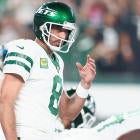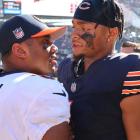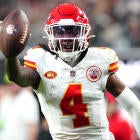 |
| Lions kicker Jason Hanson reacts after missing a field goal in the fourth quarter Sunday. (US Presswire) |
When outlining their goals for an appearance on national television, NFL players often say they hope to showcase the type of football that the team plays on a weekly basis for fans that may not regularly get to see them in action.
Sadly, the Lions did just that during their 27-20 loss to the Packers at Lambeau Field. Detroit offered a national audience a glimpse of both the good play that reminds Lions’ fans of the team’s available talent, and the maddening, self-defeating errors that have led to the team’s current five-game losing streak.
The loss featured a play that encapsulated Detroit’s entire frustrating season in a single snap. With the Lions holding a 14-3 second quarter lead, and driving into Packers’ territory, quarterback Matthew Stafford lost control of the football as he looked to set up a quick screen. The play was designed well, but Stafford simply forgot the cardinal rule of finding the laces on the football in slippery conditions. His look as the ball sailed behind him into the hands of DE Mike Daniels for a 43-yard score offered a freeze-frame representation of the frustration Lions fans have felt all year.
Offense: C-
The most difficult part of Sunday’s loss was the fact that the team had played some of its best football of the season during the first two offensive series of the game. Stafford led an efficient attack, and the Lions torched the vulnerable and admittedly shaky Green Bay defense for 149 yards of offense in two drives. The run game was dominant, with Joique Bell and Mikel Leshoure teaming up to take advantage of the absence of Packers’ LB Clay Matthews. Stafford was solid as well, using a brilliant run-fake to score on a naked bootleg, and then using multiple targets -- including his former college roommate Kris Durham -- en route to the Lions’ second score.
Then Stafford’s fumble happened.
The sudden change of possession seemed to remind the offense it had lost four straight games, and the unit’s play was never the same. After rushing for 117 yards in the opening half, Bell and Leshoure combined for just 17 yards after the break. The loss of TE Brandon Pettigrew to an ankle injury took a viable target away from Stafford, and he proceeded to force passes to Durham in several key situations that should not have been entrusted to a player in his first week on the active roster. Stafford’s over-use of Durham included a miscommunication between the two that led to Stafford’s lone interception. He finished the day with 264 passing yards in poor weather, but his post-fumble performance was far from what should be expected from him in big games.
Calvin Johnson continued his run of solid play, catching 10 of his 13 targets for 118 yards. The fact that Johnson’s performance -- albeit in poor weather -- was only his eighth-best yardage output of the season reaffirms his elite status. That said, credit should go to Packers’ CB Tramon Williams, who allowed Johnson to gain yardage, but did so in a way that never saw the star truly make an impact play. Pettigrew’s injury offered TE Tony Scheffler the chance to shine, but he didn’t take that chance. He caught a touchdown, but made just two catches on his other nine targets.
While Detroit’s offensive skill players deserve whatever rebuke they may receive, the O-line continues to produce solid efforts. They gave Stafford all day to throw, and opened plenty of holes for Lions’ runners. Previous game’s grade: B-
Defense: C
Detroit’s defense was dominant in the opening half, holding the Packers to just over seven minutes’ possession, and surrendering just three points. The D-line took advantage of the Packers’ O-line injuries by moving Ndamukong Suh to DE on several plays, clearly disrupting Packers’ QB Aaron Rodgers’ rhythm. Lawrence Jackson’s sack-fumble on Green Bay’s opening drive may have been his best play of the season. Jackson never gave up on the play, shaking off two blockers to eventually separate Rodgers from the football.
Detroit’s LB and secondary play was also solid before halftime. LB Stephen Tulloch recovered Jackson’s strip, and the pressure provided by the front four allowed the back seven the freedom to make aggressive plays on the ball.
In the second half, however, the defense’s performance was typical of the poor play that has hurt the Lions on their current five-game skid. The D-line sacked Rodgers twice after halftime -- including a play by Nick Fairley that led to a missed Packer field goal -- but they also allowed Rodgers far too much time to scramble in the pocket, giving his receivers ample opportunity to get open against the Lions’ vulnerable secondary.
Both the D-line and linebackers struggled to stop the run after halftime, allowing the Packers’ hodgepodge backfield to gain 98 second half yards on 18 carries (5.4 YPC). Some of the unit’s difficulties against the run can be traced to lackluster ball pursuit by OLBs DeAndre Levy and Justin Durant (9 combined tackles), but credit must also be given to the Packers’ O-line for making adjustments that stymied Detroit’s front four.
The secondary benefitted from strong D-line play early, but struggled when forced to try and stay with receivers in the second half. Their performance is best summed up by the fact that the unit was not credited with a single pass breakup all game. Previous game’s grade: C
Special Teams: C
Coordinator Danny Crossman’s unit was as average as their ‘C’ grade suggests. Detroit’s kick coverage teams did a decent job of limiting Packers’ KR Randall Cobb, by allowing him to gain yardage without ever threatening the end zone. Lions’ KR Stefan Logan averaged 24 yards per kick return, which was a solid performance given the tough conditions. That said, he never gave the Lions’ a chance for a big runback that could have changed the game.
Kicker Jason Hanson converted two of three field goal attempts, but his efforts were mitigated by another off day for punter Nick Harris, who averaged just 35 yards per kick. Previous game’s grade: C-
Coaching: D-
The Lions’ coaching staff deserves credit for the inventive early play calling that led to Detroit’s 14-10 halftime lead, but Jim Schwartz and his coordinators also deserve an equal measure of criticism for the predictable plays they ran at the first sign of trouble. At 4-8, they had the opportunity to take more risks with their game plan, and perhaps discover something about their players in the process. Instead, they chose the safe route that led to another loss. Previous game’s grade: D+
Follow Lions reporter John Kreger on Twitter at @CBSLions and @JohnKreger




















